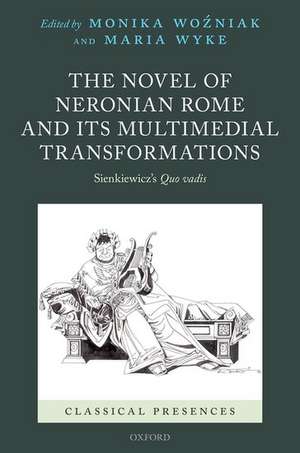The Novel of Neronian Rome and its Multimedial Transformations: Sienkiewicz's Quo vadis: Classical Presences
Editat de Monika Woźniak, Maria Wykeen Limba Engleză Hardback – 16 dec 2020
Din seria Classical Presences
- 28%
 Preț: 473.71 lei
Preț: 473.71 lei - 30%
 Preț: 493.26 lei
Preț: 493.26 lei - 30%
 Preț: 501.15 lei
Preț: 501.15 lei - 27%
 Preț: 476.23 lei
Preț: 476.23 lei - 6%
 Preț: 337.35 lei
Preț: 337.35 lei - 30%
 Preț: 540.38 lei
Preț: 540.38 lei - 28%
 Preț: 474.92 lei
Preț: 474.92 lei - 30%
 Preț: 501.92 lei
Preț: 501.92 lei - 6%
 Preț: 226.46 lei
Preț: 226.46 lei - 25%
 Preț: 687.80 lei
Preț: 687.80 lei - 17%
 Preț: 582.93 lei
Preț: 582.93 lei - 30%
 Preț: 821.25 lei
Preț: 821.25 lei - 26%
 Preț: 614.24 lei
Preț: 614.24 lei - 19%
 Preț: 677.96 lei
Preț: 677.96 lei - 18%
 Preț: 704.79 lei
Preț: 704.79 lei - 30%
 Preț: 538.77 lei
Preț: 538.77 lei - 30%
 Preț: 645.95 lei
Preț: 645.95 lei - 30%
 Preț: 501.52 lei
Preț: 501.52 lei - 30%
 Preț: 617.54 lei
Preț: 617.54 lei - 27%
 Preț: 519.88 lei
Preț: 519.88 lei - 16%
 Preț: 706.89 lei
Preț: 706.89 lei - 25%
 Preț: 554.32 lei
Preț: 554.32 lei - 16%
 Preț: 584.68 lei
Preț: 584.68 lei - 30%
 Preț: 562.14 lei
Preț: 562.14 lei - 30%
 Preț: 598.80 lei
Preț: 598.80 lei - 25%
 Preț: 612.31 lei
Preț: 612.31 lei - 30%
 Preț: 589.73 lei
Preț: 589.73 lei - 30%
 Preț: 789.84 lei
Preț: 789.84 lei - 30%
 Preț: 600.20 lei
Preț: 600.20 lei - 30%
 Preț: 611.82 lei
Preț: 611.82 lei - 29%
 Preț: 1083.87 lei
Preț: 1083.87 lei - 30%
 Preț: 720.23 lei
Preț: 720.23 lei - 19%
 Preț: 326.97 lei
Preț: 326.97 lei - 26%
 Preț: 760.17 lei
Preț: 760.17 lei - 30%
 Preț: 833.88 lei
Preț: 833.88 lei -
 Preț: 307.88 lei
Preț: 307.88 lei - 28%
 Preț: 446.91 lei
Preț: 446.91 lei - 30%
 Preț: 721.88 lei
Preț: 721.88 lei - 30%
 Preț: 575.88 lei
Preț: 575.88 lei - 30%
 Preț: 598.02 lei
Preț: 598.02 lei - 30%
 Preț: 803.03 lei
Preț: 803.03 lei - 30%
 Preț: 733.67 lei
Preț: 733.67 lei - 30%
 Preț: 701.54 lei
Preț: 701.54 lei - 30%
 Preț: 601.52 lei
Preț: 601.52 lei - 30%
 Preț: 747.48 lei
Preț: 747.48 lei - 30%
 Preț: 556.05 lei
Preț: 556.05 lei - 30%
 Preț: 818.03 lei
Preț: 818.03 lei - 30%
 Preț: 716.96 lei
Preț: 716.96 lei
Preț: 616.61 lei
Preț vechi: 826.75 lei
-25% Nou
Puncte Express: 925
Preț estimativ în valută:
117.99€ • 123.52$ • 97.63£
117.99€ • 123.52$ • 97.63£
Carte tipărită la comandă
Livrare economică 25-31 martie
Preluare comenzi: 021 569.72.76
Specificații
ISBN-13: 9780198867531
ISBN-10: 0198867530
Pagini: 350
Dimensiuni: 165 x 240 x 25 mm
Greutate: 0.72 kg
Editura: OUP OXFORD
Colecția OUP Oxford
Seria Classical Presences
Locul publicării:Oxford, United Kingdom
ISBN-10: 0198867530
Pagini: 350
Dimensiuni: 165 x 240 x 25 mm
Greutate: 0.72 kg
Editura: OUP OXFORD
Colecția OUP Oxford
Seria Classical Presences
Locul publicării:Oxford, United Kingdom
Recenzii
His paper is based on intimate acquaintance with the rhythms, leaders and main themes of Polish classicism. This level of insight should appeal greatly to an anglophone audience, who will surely learn much from its observations on the importance of Latinity to the creation of a Polish national image, especially under the Russian and German occupations, and from its analysis of the ways in which the Polish language was masterfully employed to construct an inspirational but believable picture of Neronian Rome.
The Novel of Neronian Rome and its Multimedial Transformations: Sienkiewicz's "Quo vadis" is a significant contribution to the field of classical reception in general and specifically on the various permutations of Quo vadis. Whether within an individual chapter or section or the entire collection, teachers, students, and scholars of Nero, ancient Rome on screen, and the reception of Rome in general will find much useful and interesting material.
The Novel of Neronian Rome and its Multimedial Transformations: Sienkiewicz's "Quo vadis" is a significant contribution to the field of classical reception in general and specifically on the various permutations of Quo vadis. Whether within an individual chapter or section or the entire collection, teachers, students, and scholars of Nero, ancient Rome on screen, and the reception of Rome in general will find much useful and interesting material.
Notă biografică
Monika Woźniak is Associate Professor of Polish Language and Literature at the University of Rome 'La Sapienza'. Her research has addressed issues of literary translation, children's literature in translation, and audiovisual translation. She is co-author of Historia na ekranie. Gatunek filmowy a przekład audiowizualny (History on the Screen. Cinematographic Genre and Audiovisual Translation) (Kraków, 2018). She is co-editor of Cinderella across Cultures (Wayne University Press, 2016) and the conference proceedings Quo vadis: da caso letterario al fenomeno della cultura di massa (Rome, 2016).Maria Wyke is Professor of Latin at University College London. Her research interests include the reception of ancient Rome, especially in popular culture. She is the author of Projecting the Past: Ancient Rome, Cinema and History (Routledge, 1997), The Roman Mistress: Ancient and Modern Representations (OUP, 2000), Caesar: A Life in Western Culture (Granta and the University of Chicago Press, 2007), and Caesar in the USA (University of California Press, 2012). Wyke has edited or co-edited eight volumes to date, including The Ancient World in Silent Cinema (CUP, 2013), Julius Caesar in Western Culture (Blackwell, 2006), and The Uses and Abuses of Antiquity (Peter Lang, 1999).
